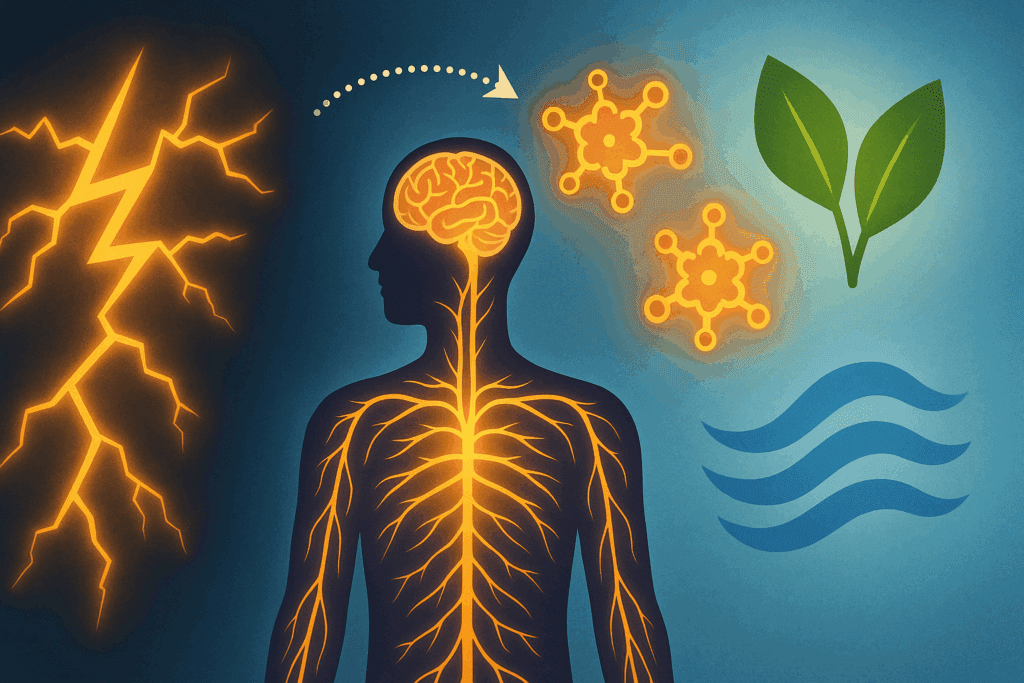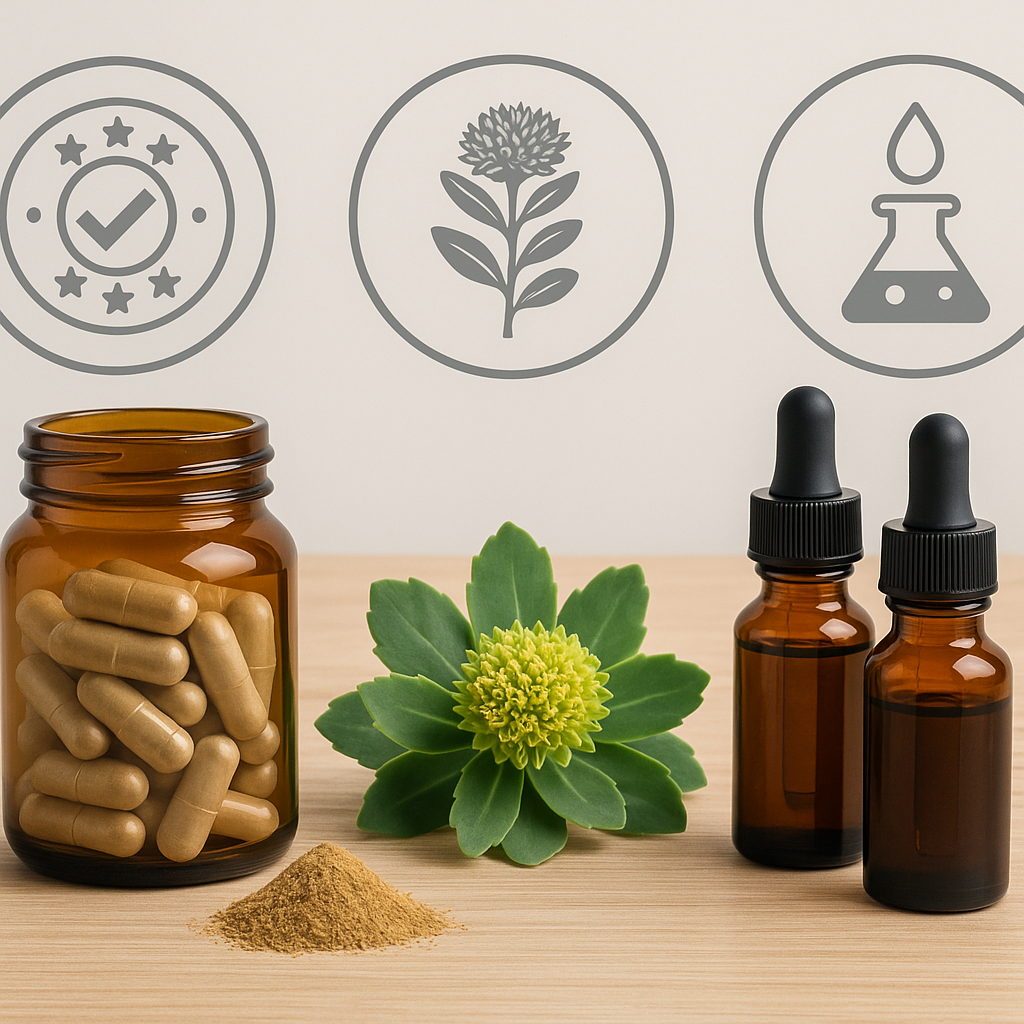In today’s fast-paced world, stress has become more than just an occasional inconvenience—it is now a chronic companion for many individuals. Amid the growing need for natural solutions to manage stress and anxiety, rhodiola rosea supplements have emerged as a powerful and scientifically supported ally. Derived from the golden root native to the cold mountainous regions of Europe and Asia, Rhodiola rosea is classified as an adaptogen, a natural substance that helps the body adapt to stress and restore balance. Its rising popularity among wellness professionals, naturopaths, and even conventional physicians reflects a broader shift toward holistic approaches that prioritize resilience and recovery over mere symptom suppression.
You may also like: Unlock Powerful Stress-Relief with Adaptogenic Mushrooms and Stamina Herbal Support

Understanding the Adaptogenic Nature of Rhodiola Rosea
To appreciate the essential role of rhodiola rosea supplements in stress management, it is important first to understand what makes an adaptogen unique. Adaptogens are natural compounds that promote homeostasis by modulating the body’s response to physical, chemical, and biological stressors. Unlike pharmaceuticals that typically target one specific mechanism, adaptogens like Rhodiola work by enhancing the body’s overall capacity to resist stress.
Rhodiola rosea stands out in the adaptogenic category due to its broad spectrum of bioactive compounds, including rosavins and salidroside, which are considered responsible for its therapeutic effects. These compounds interact with stress-response pathways in the hypothalamic-pituitary-adrenal (HPA) axis and modulate the production of stress hormones such as cortisol. By doing so, rhodiola does not merely suppress stress symptoms but instead promotes a state of balance and resilience that enhances overall well-being. Moreover, its adaptogenic effects extend beyond stress to include support for fatigue, mood disorders, and even cognitive performance.

The Historical Roots and Cultural Relevance of Rhodiola Rosea
Rhodiola rosea has a long history of traditional use that spans continents and centuries. In the harsh climates of Siberia, people consumed Rhodiola to increase physical endurance and combat fatigue. The Vikings used it to enhance strength and stamina, while in traditional Chinese medicine, it was revered for its ability to balance qi—the life force energy. These diverse applications reflect the plant’s multifaceted nature and its longstanding role in human health.
In more recent history, Soviet scientists conducted extensive research on Rhodiola rosea during the Cold War, investigating its potential to enhance the performance of cosmonauts, military personnel, and Olympic athletes. This body of research helped validate traditional knowledge with modern science, leading to rhodiola’s formal classification as an adaptogen in Russian medicine. Today, this legacy informs ongoing clinical studies and continues to inspire new applications in integrative health practices.
Biological Mechanisms Behind Rhodiola’s Stress-Relief Benefits
The stress-relief potential of rhodiola rosea supplements lies in their ability to modulate several key biological systems. At the forefront is the HPA axis, the central command center for stress responses. When an individual is exposed to stress, the HPA axis is activated, leading to the release of cortisol and other stress hormones. While short-term cortisol elevation is beneficial for immediate survival, chronic activation can lead to a host of issues including anxiety, depression, sleep disturbances, and immune suppression.
Rhodiola acts on the HPA axis by attenuating the stress signal and normalizing cortisol levels. This is achieved in part through the inhibition of monoamine oxidase enzymes, which allows for higher concentrations of neurotransmitters such as serotonin and dopamine. These neurochemicals are essential for mood regulation and cognitive function, which explains why rhodiola is often associated with improvements in emotional well-being and mental clarity.
In addition to its effects on the HPA axis, rhodiola has been shown to influence the sympathetic nervous system, reducing the body’s fight-or-flight response and enhancing parasympathetic (rest-and-digest) activity. This dual action helps create a physiological environment that is more conducive to relaxation, recovery, and healing.

Rhodiola Rosea Supplements and Cognitive Performance Under Stress
One of the most remarkable aspects of rhodiola rosea supplements is their capacity to enhance cognitive function in stressful environments. Numerous studies have demonstrated that rhodiola improves attention, memory, and executive functioning in individuals exposed to acute stressors such as sleep deprivation, high workloads, or emotionally taxing situations.
This cognitive benefit is particularly relevant in professional and academic settings where high performance is expected despite the presence of chronic stress. Rhodiola’s neuroprotective effects help prevent the deterioration of mental faculties under pressure, making it a valuable tool for students, corporate executives, and healthcare workers alike. For example, a randomized, double-blind study published in the journal Phytomedicine found that rhodiola extract significantly reduced mental fatigue and improved task performance among physicians working night shifts.
These findings are supported by mechanistic studies showing that rhodiola enhances mitochondrial energy production and reduces oxidative stress in brain tissues. By optimizing energy metabolism and protecting neuronal integrity, rhodiola creates the conditions for sustained mental agility even in the face of demanding challenges.

Emotional Resilience and the Role of Rhodiola in Mood Support
In addition to cognitive performance, rhodiola rosea supplements offer profound benefits for emotional resilience. Individuals suffering from anxiety, depression, or mood instability often find themselves caught in a cycle of reactivity that amplifies stress and diminishes coping capacity. Rhodiola intervenes in this cycle by modulating key neurotransmitter systems involved in mood regulation.
The plant’s active constituents increase the availability of serotonin, norepinephrine, and dopamine in the brain—neurochemicals that play pivotal roles in motivation, pleasure, and emotional stability. Unlike conventional antidepressants that may take weeks to show results and often come with undesirable side effects, rhodiola has been shown to exert mood-stabilizing effects within days and with a relatively low risk of adverse reactions.
One open-label study conducted in Sweden reported that individuals with mild-to-moderate depression experienced significant improvements in emotional well-being after taking rhodiola extract daily for six weeks. Participants noted reductions in irritability, anxiety, and feelings of inadequacy, highlighting rhodiola’s role as a gentle yet effective mood enhancer.
The Science Behind Rhodiola Extract Formulations
While the term “rhodiola rosea supplements” encompasses a wide range of products, not all formulations are created equal. The therapeutic efficacy of rhodiola depends significantly on the concentration of its active compounds—specifically rosavins and salidroside. High-quality rhodiola extract typically contains a standardized ratio of these constituents, often 3% rosavins and 1% salidroside, to ensure consistent pharmacological activity.
The method of extraction also matters. Hydroalcoholic extracts are commonly used because they preserve a broad range of phytochemicals that contribute to rhodiola’s synergistic effects. Some formulations may also incorporate complementary herbs or nutrients such as magnesium or vitamin B6 to enhance adaptogenic properties.
When selecting a supplement, consumers should prioritize products that are third-party tested for purity and potency. Look for certifications that verify the absence of contaminants such as heavy metals, pesticides, and microbial pathogens. Transparent labeling and clinical-grade manufacturing practices are additional markers of a reputable rhodiola extract.
Clinical Evidence Supporting Rhodiola Rosea Supplements for Anxiety and Stress
The body of scientific literature on rhodiola rosea is robust and growing. Clinical trials conducted across diverse populations have consistently shown that rhodiola reduces symptoms of stress, enhances mood, and improves quality of life. In a study involving university students during exam season, those who took rhodiola supplements reported better concentration, less fatigue, and improved academic performance compared to placebo.
Another double-blind, placebo-controlled trial published in the Nordic Journal of Psychiatry evaluated the efficacy of rhodiola in individuals diagnosed with generalized anxiety disorder. Participants who received a daily dose of rhodiola extract experienced significant reductions in anxiety scores as measured by standardized scales such as the Hamilton Anxiety Rating Scale (HAM-A).
Importantly, these benefits were achieved without the side effects commonly associated with anxiolytic medications, such as sedation or cognitive dulling. This positions rhodiola rosea supplements as a compelling alternative or adjunct to conventional therapies for individuals seeking natural, evidence-based solutions.
Integrating Rhodiola Rosea into a Holistic Stress-Relief Regimen
While rhodiola rosea supplements offer substantial standalone benefits, their effectiveness can be further amplified when integrated into a comprehensive stress-relief strategy. Lifestyle factors such as nutrition, sleep hygiene, physical activity, and mindfulness practices all play synergistic roles in modulating the stress response.
For instance, pairing rhodiola supplementation with regular aerobic exercise has been shown to enhance cardiovascular resilience and mood stability. Similarly, incorporating adaptogenic mushrooms such as reishi or lion’s mane into the diet may provide complementary neuroprotective and immune-boosting effects. These synergistic combinations create a multi-pronged approach that addresses the physiological, psychological, and biochemical dimensions of stress.
Mindfulness-based practices such as meditation, yoga, and deep-breathing exercises also pair well with rhodiola supplementation. By promoting parasympathetic activation, these practices reinforce the calming effects of rhodiola and help solidify new patterns of stress resilience.
Safety Profile and Potential Side Effects of Rhodiola Rosea Supplements
Although rhodiola rosea is generally considered safe for most individuals, it is not entirely without potential side effects or contraindications. Some users report mild symptoms such as dry mouth, dizziness, or gastrointestinal discomfort, particularly when taking high doses or when initiating supplementation.
Rhodiola may interact with certain medications, including antidepressants, blood pressure drugs, and stimulants. Therefore, individuals who are pregnant, breastfeeding, or managing chronic health conditions should consult a healthcare provider before beginning a rhodiola regimen. Timing also matters; because rhodiola has mild stimulating effects, it is typically recommended to take it earlier in the day to avoid sleep disturbances.
As with any botanical supplement, individualized dosing is key. Starting with a lower dose and gradually increasing based on tolerance and need is often the most prudent approach. Monitoring changes in mood, energy, and sleep can help guide optimal usage and prevent unwanted reactions.
The Future of Adaptogenic Research and Rhodiola’s Place Within It
The rising interest in adaptogenic herbs reflects a broader cultural movement toward integrative and preventative medicine. As the limitations of pharmaceutical approaches become increasingly apparent, consumers and clinicians alike are exploring natural alternatives that offer multi-dimensional benefits with fewer risks.
Rhodiola rosea supplements are at the forefront of this movement, not only because of their robust clinical backing but also due to their versatility and accessibility. Ongoing research is exploring rhodiola’s potential in areas such as metabolic health, immune regulation, and even oncology. Preliminary studies suggest that rhodiola may enhance immune surveillance and inhibit the growth of certain tumor cells, though more research is needed to substantiate these findings.
Furthermore, advances in phytochemical analysis and systems biology are providing deeper insights into how rhodiola interacts with human physiology. These insights will likely inform the development of more targeted and personalized supplement protocols that maximize efficacy and minimize risk.

How to Choose High-Quality Rhodiola Rosea Supplements for Stress and Anxiety
Given the increasing popularity of rhodiola rosea, the supplement market has become crowded with options—not all of which meet the highest standards of quality and efficacy. To navigate this landscape, consumers should prioritize transparency, standardization, and scientific validation.
Look for rhodiola products that disclose their exact composition, including the percentages of rosavins and salidroside. Products that follow Good Manufacturing Practices (GMP) and undergo third-party testing offer additional layers of safety and reliability. Reputable brands often publish Certificates of Analysis (CoAs) that confirm the absence of contaminants and the presence of active constituents in therapeutic doses.
Additionally, consider the form of the supplement. While capsules are the most common, rhodiola is also available in tinctures, teas, and powders. Each format has its own advantages in terms of absorption, convenience, and customization. For example, liquid extracts may be preferred by those seeking rapid onset, while powders allow for flexible dosing.
Frequently Asked Questions (FAQ) on Rhodiola Rosea and Adaptogenic Support
What are some lesser-known benefits of rhodiola rosea supplements beyond stress relief?
While rhodiola rosea supplements are widely recognized for their stress-reducing capabilities, they also offer several lesser-known health benefits. For instance, emerging research suggests rhodiola may play a role in regulating blood sugar levels and enhancing insulin sensitivity, which could support metabolic health in individuals with prediabetes or type 2 diabetes. Additionally, rhodiola appears to possess anti-inflammatory and antioxidant properties that may benefit cardiovascular health by protecting blood vessels from oxidative damage. Some athletes also use rhodiola extract to improve oxygen utilization during physical exertion, which can be particularly helpful at high altitudes or during endurance training. Finally, early evidence suggests rhodiola may have applications in managing chronic fatigue syndrome and fibromyalgia, providing subtle but cumulative improvements in energy and resilience over time.
Can rhodiola rosea supplements influence sleep patterns or circadian rhythms?
Yes, rhodiola rosea supplements can indirectly influence sleep by modulating the body’s stress response and supporting circadian balance. When taken earlier in the day, rhodiola helps reduce overactive cortisol production and calms the nervous system, which may lead to improved sleep onset and quality later at night. However, timing is key—taking rhodiola too late in the day may disrupt sleep for some individuals due to its mild stimulating effects. Some users report fewer nighttime awakenings and better REM sleep after a few weeks of consistent use, possibly due to normalized melatonin signaling. Furthermore, when paired with good sleep hygiene and practices like avoiding blue light exposure in the evening, rhodiola can be part of an effective natural strategy to support healthy circadian rhythms.
How do rhodiola extract preparations vary, and why does it matter for effectiveness?
Not all rhodiola extract formulations are created equal, and the differences can significantly affect their therapeutic outcomes. The efficacy of an extract hinges on the concentration and balance of active compounds—especially rosavins and salidroside. Products with standardized ratios, typically 3% rosavins to 1% salidroside, are more likely to deliver reliable results because they reflect the natural phytochemical profile studied in clinical trials. Some preparations also use different extraction solvents, such as water, ethanol, or glycerin, each of which extracts different types of compounds. Consumers should also consider whether the supplement includes synergistic ingredients like vitamin B complexes or magnesium, which can further enhance stress resilience. Choosing a clinically validated and well-sourced rhodiola extract ensures consistency, bioavailability, and a reduced likelihood of contaminants or ineffective dosages.
Are there specific populations that may benefit more from rhodiola rosea supplements?
Certain populations may derive particularly strong benefits from incorporating rhodiola rosea supplements into their wellness routines. For instance, individuals in high-stress professions—such as healthcare workers, first responders, and educators—often find rhodiola helpful in sustaining focus and emotional stability under pressure. Students and academics may also benefit from its effects on cognitive performance and mental stamina during demanding periods. Aging adults might use rhodiola to mitigate age-related fatigue and support cognitive clarity, especially in combination with other adaptogens. Furthermore, those recovering from burnout or chronic illness may find rhodiola useful for gradually restoring energy and physiological balance without overtaxing the body. However, each case should be evaluated individually, ideally with professional guidance, to ensure proper dosing and to avoid contraindications.
How does rhodiola interact with other adaptogens or herbal supplements?
Rhodiola rosea is often used synergistically with other adaptogens and herbal remedies, creating layered effects that support multiple aspects of well-being. For example, combining rhodiola extract with ashwagandha can offer both energizing and calming properties, making it suitable for individuals experiencing fatigue with anxiety. Pairing rhodiola with cordyceps may enhance stamina and athletic performance, while stacking it with reishi mushroom can deepen relaxation and support immune resilience. When taken together, these adaptogens may help regulate the HPA axis more comprehensively than any one herb alone. However, because these herbs can influence neurotransmitter activity and hormonal levels, it’s essential to introduce combinations gradually and observe how the body responds over time. Consulting with a naturopath or integrative physician can help customize combinations for optimal results.
Can rhodiola rosea supplements help with emotional regulation during hormonal changes?
Yes, rhodiola rosea supplements may support mood stability and emotional regulation during periods of hormonal transition, such as menopause, perimenopause, or postpartum recovery. These phases often involve shifts in estrogen, progesterone, and cortisol levels, which can destabilize mood and increase vulnerability to stress. Rhodiola appears to modulate cortisol and boost neurotransmitters like serotonin and dopamine, potentially easing mood swings and irritability linked to hormonal changes. Some women report fewer hot flashes and less emotional volatility when using rhodiola in combination with lifestyle adjustments and hormone-balancing strategies. It may also help during premenstrual phases, where tension and fatigue are common, though it is not a replacement for clinically indicated hormonal therapies. As always, discussing use with a healthcare provider is recommended when hormones are actively shifting.
What should you consider before introducing rhodiola rosea supplements into a daily routine?
Before starting rhodiola rosea supplements, it’s important to assess your current stress levels, medication usage, and health goals. While generally safe, rhodiola can interact with antidepressants, thyroid medications, and stimulants, making a medical review essential for anyone on prescription drugs. Also consider the time of day: morning is typically ideal for rhodiola, as it supports alertness without overstimulation. Start with a low dose and gradually increase, noting how it affects mood, energy, and sleep over one to two weeks. It’s also wise to avoid using rhodiola during acute illness or intense physical recovery without supervision, as its stimulating nature might interfere with the body’s need to rest. Look for third-party verified supplements with a consistent rhodiola extract concentration for reliable and safe results.
How do rhodiola rosea supplements compare to pharmaceutical stress-reduction treatments?
Compared to pharmaceutical options like SSRIs or benzodiazepines, rhodiola rosea supplements offer a gentler, more holistic pathway to stress reduction with fewer side effects. Unlike pharmaceuticals, which often require weeks to become effective and carry risks such as dependency or emotional numbing, rhodiola can begin to show subtle improvements within days. It does not typically cause sedation or cognitive dulling, allowing users to remain alert and productive throughout the day. However, it may not be sufficient as a standalone treatment for severe depression or anxiety disorders; instead, it works best as a complementary approach for mild to moderate stress-related conditions. One advantage of rhodiola is its support for both mental and physical endurance, whereas pharmaceuticals typically address only specific mental health symptoms. Ultimately, the choice between herbal and pharmaceutical support should be guided by professional evaluation and personal health history.
How do athletes and fitness enthusiasts utilize rhodiola extract to enhance performance?
Athletes and active individuals often turn to rhodiola extract for its performance-enhancing and recovery-supportive properties. By improving oxygen efficiency and reducing perceived exertion, rhodiola can help extend endurance during long workouts or competitions. Its antioxidant effects also contribute to faster recovery by reducing muscle inflammation and cellular stress following intense training. Additionally, rhodiola may enhance mitochondrial function, which plays a central role in energy production, especially in endurance sports like cycling, running, or swimming. Many athletes report feeling a reduced need for rest days when using rhodiola consistently, though it’s still essential to balance use with adequate nutrition and rest. To avoid overstimulation or adrenal burnout, athletes should monitor their body’s responses closely and cycle rhodiola usage as part of a broader performance plan.
What is the long-term outlook for research and innovation in rhodiola rosea supplements?
The future of research into rhodiola rosea supplements looks promising, with new investigations focusing on personalized medicine, advanced extraction techniques, and broader therapeutic applications. Scientists are now exploring how genetic variability may affect individual responses to rhodiola, opening the door to customized adaptogenic protocols. Innovations in nanotechnology are also being explored to improve rhodiola’s bioavailability, allowing smaller doses to deliver more potent results. Additionally, researchers are studying rhodiola’s potential in treating neurodegenerative conditions, metabolic syndrome, and even adjunctive cancer therapies. As public interest in natural health grows and demand for non-pharmaceutical stress solutions rises, we can expect rhodiola extract to play a central role in the next generation of integrative health products. With greater regulatory oversight and clinical validation, rhodiola is well-positioned to become a cornerstone of modern adaptogenic science.
Conclusion: Embracing Rhodiola Rosea as a Cornerstone of Holistic Stress Relief
In a world where stress-related disorders are on the rise and conventional treatments often fall short, the essential role of rhodiola rosea supplements cannot be overstated. From its rich historical roots to its modern clinical validation, rhodiola exemplifies the promise of adaptogenic medicine to foster resilience, restore balance, and elevate quality of life.
By modulating the HPA axis, enhancing neurotransmitter activity, and supporting cognitive and emotional health, rhodiola provides a comprehensive solution that goes beyond symptomatic relief. Its synergistic potential with other adaptogens, lifestyle interventions, and mindfulness practices makes it a versatile tool for anyone committed to holistic wellness.
As research continues to unravel the depths of rhodiola’s benefits, its place in both preventive and therapeutic contexts is becoming increasingly clear. For those seeking a natural, evidence-based approach to managing stress and enhancing well-being, rhodiola rosea supplements stand as a vital and trustworthy ally—one that bridges the wisdom of tradition with the rigor of modern science.
Further Reading:
7 Science-Backed Health Benefits of Rhodiola rosea
Rhodiola rosea as an adaptogen to enhance exercise performance: a review of the literature
